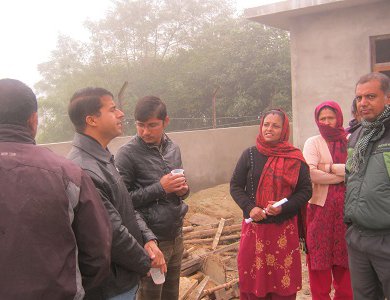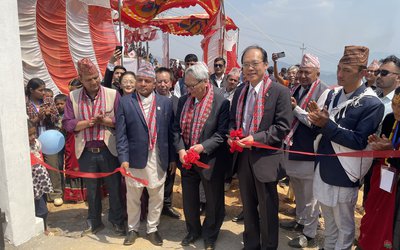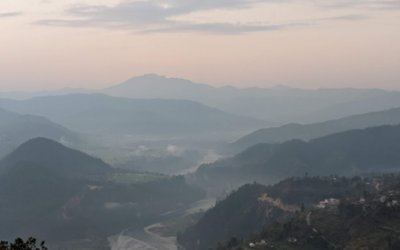
Although the democratic process at the grass roots level came to an end following the dissolution of the local bodies in 2002, the people are find other means to express their voices and deciding through their local democratic exercises. Whether it is in the management of drinking water or construction of road or irrigation, user groups are taking a lead in the local affairs.
At a time when many development works at the local level are stalled in the absence of locally elected bodies, some communities have found other ways to make their work accountable and transparent. Meghauli Small Towns Water Supply and Sanitation User Group is one of the examples.
As the centralized development projects are facing the question of sustainability, the Asian Development Bank is pushing local community managed model in rural and small urban areas to make the communities more responsive to their own projects.
According to Asian Development Bank, the expected impact of the project is improved health and economic and environmental living conditions of people in small towns in Nepal. The expected outcome of the project is improved affordable and sustainable water supply and sanitation services which are governed and managed by locally accountable representative bodies.
Fed up with drinking water contained with arsenic and high level iron, community of Meghauli Village of Chitwan District, 150 kilometers South West of Capital Kathmandu, spent a lot of money for their medical treatment.
Indra Bahadur K.C, chairman of Meghauli Drinking Water Project, remembered those days when they spared no time to knock the door of politicians and technocrats. However, all went in vain. “By drinking polluted water, we paid a high health cost to treat our water-borne diseases. We decided to go any extent to have clean drinking water. Then came Second Small Towns Water Supply and Sanitation Project to save us,” said K.C, an elected chairman of the community.
The user group has already fixed the tariff. Each household will have to pay Rs. 260.00 per month for ten thousands liter of water. “This amount of money is nothing but peanuts compared to what each family used to pay in medical bill to treat water borne diseases,” said Pabitra Poudel, member of the User Group. “Ours is an elected body and we can decide on each and every matter related to the project after intense discussions in the committee.”
Registered with the government, Meghauli Drinking Water and Sanitation User Group has certain limitations as it cannot take care of all issues as a Village Development Committee can do. But, they hold periodic elections to choose their members and other stakeholders to take care of the issues related to water and sanitation.
Taking the decision to be a part of over 200 million project, they have shown that user groups cannot substitute to the elected Village Development Committee but they can give space to local people in the decision making process.
Bordering with Chitwan National Park, Meghauli has enough surface water as well as ground water. However, the surface water of Rapti river is polluted and underground water in the areas pumped from wells contaminated with arsenic and high level of iron.
Knowing that Small Towns Water Supply Project will provide the certain amount of grant in case of their agreement to collect half amount of money, K.C along with others visited the Division Office in Chitwan.
The project will cover wards 3,4,5,6,7,8 and 9 of the villages. With 1,765 households, the permanent population of the areas is 11,180. However the project is designed for 18,176 population. Situated in the buffer zone of Chitwan National Park, the village comprises various indigenous groups.
Started in January 2013 with an aim to complete the project in 15 July 2014, the project construction is in full swing to meet the target. With the total cost of NRs 209,310,407.06, there will be two deep tube wells and 533 meter transmission and 56,019 meter distribution lines. There will be 99 connections for the poor households. Interestingly, half of the money will be borne by the user’s group.
Although it lies in the buffer zone of Chitwan National Park at the Bank of Rapti river which is known for Ghariyal Breeding, the community has already selected a nearby land to collect the waste water. “ As it lies in the buffer zone of Chitwan National Park, we are taking all environmental safety measures not to harm the eco-system and wild animals of the park,” said Deepak Bahadur Singh, senior environment officer Nepal Resident Mission Asian Development Bank.
As Nepal’s small towns have been facing water deficiency in terms of both coverage and quality of water, the Asian Development Bank supported project provides safe, accessible and adequate water supply and sanitation facilities in about 20 towns with average 16,000 per town.
“We have been implementing the projects in 20 small towns like in Meghauli to provide water supply services to 240,000 people and sanitation services to 270,000 people,” said Ram Deep Shah, project manager. “One of the beauties of the project is that local people get involved in the project from the initial period. Communities are the key stakeholders and it is the user groups, which are responsible for selection and operation of the project.”
As there is the involvement of the community at all the levels, the projects will be based on democratic principle for the people, by the people and to the people where the community are the masters and main stakeholders.

Keshab Poudel
Poudel is the editor of New Spotlight Magazine.
- IWMI: SoLAR Global Science-Policy Forum Conference
- Apr 25, 2024
- CLA: Samriddhi For Skill Development
- Apr 23, 2024
- ECONOMY: Growth At 3.3
- Apr 16, 2024
- DPM’s SHRESTHA’S CHINA VISIT High Profile, Low Key
- Apr 14, 2024
- Maha Kumbha In Barahkshetra: A Sacred Festival In Sacred Koshi (Kaushiki) River
- Apr 09, 2024
















